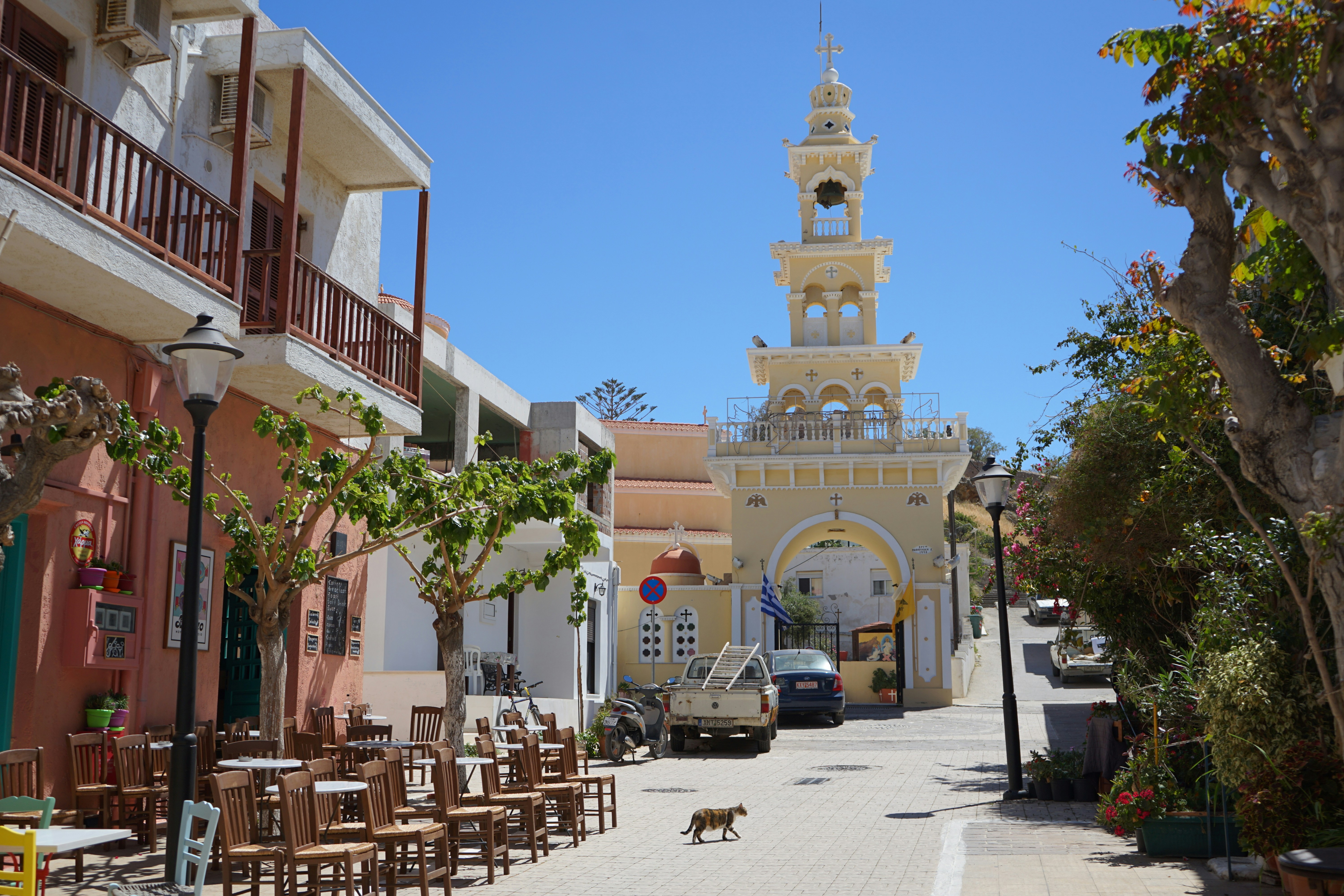Greece Financially Independent Person (FIP) Visa

Quick Visa Facts
Visa length 3 years
Possible to extend? Yes, for another 3 years.
Who can apply? Non-EU/EEA nationals with sufficient income; spouse and children under 18 included.
Minimum Income Requirements No official amount; guidance suggests ~€2,000/month for the main applicant.
Time for visa applications Several weeks to a few months; renewals should be applied for at least 2 months before expiry.
Want to know if you can apply?
Complete a visa quiz and see if you qualify!
Thinking about living in Greece without needing to work there? The Residence Permit for Persons with Sufficient Financial Means (formerly known as the Financially Independent Person (FIP) permit) was designed exactly for that purpose. This residence option allows non-EU nationals who can support themselves financially to settle in Greece and enjoy the country’s lifestyle, history, and Mediterranean climate, without needing to engage in local employment.
Unlike work or investment visas, this permit is based purely on proving you have a stable, adequate income or resources to live comfortably in Greece. It’s especially popular among retirees, remote income earners, and individuals who simply want the flexibility of living in Greece without tying their stay to a job or a business.
The rules for this permit were updated under Law 5038/2023 (the new Greek Immigration Code), which came into force on 1 January 2024. This law officially renamed and clarified the framework for residence permits based on sufficient financial means. Understanding the new requirements is key to planning your application.
In this guide, we’ll walk you through everything you need to know: who qualifies, the financial requirements, how to apply, and the rights and limitations associated with this permit.
 Greek Residence Permit for Persons with Sufficient Financial Means Overview
Greek Residence Permit for Persons with Sufficient Financial Means Overview
The Residence Permit for Persons with Sufficient Financial Means offers a legal pathway for non-EU nationals to live in Greece without needing to work or invest. It was updated under Law 5038/2023, Greece’s new Immigration Code, which came into effect on 1 January 2024.
This residence option is designed for individuals who can prove they have stable and adequate income or resources to support themselves and their families while living in Greece. The initial permit is valid for three years, and it can be renewed for another three years as long as the conditions continue to be met.
Who Is It For?
Non-EU/EEA nationals who want to reside in Greece.
People with stable income or sufficient financial means (such as pensions, investments, or other resources) that cover their living expenses.
Individuals who wish to enjoy living in Greece without depending on local employment.
Spouses and children under 18 may also qualify as dependent family members under the main applicant’s permit.
What Does It Allow You to Do?
Live legally in Greece with full residency rights for the duration of the permit.
Include your immediate family, with dependent permits expiring at the same time as the main permit.
Access healthcare and education services as residents, provided you maintain valid private health insurance or equivalent coverage.
Travel freely within the Schengen Area for short stays (up to 90 days in any 180-day period).
Important restriction: This permit does not allow you to work or run a business in Greece. Its sole purpose is to provide residency based on your independent financial capacity.

Greek Residence Permit for Persons with Sufficient Financial Means Requirements
To apply for the Residence Permit for Persons with Sufficient Financial Means, applicants must prepare a set of official documents. While exact requirements may vary slightly depending on the Greek consulate or regional authority, the following are generally necessary:
Completed application form.
Valid passport (with sufficient validity and copies of all pages)
Recent passport-sized photographs (biometric standards)
National Visa (Type D) issued by the Greek consulate in your home country.
Official translations of foreign documents into Greek (where required)
Proof of residential address in Greece.
Receipt of government fee payment (application fee)
In addition to these basics, applicants must also provide documents proving their financial independence and medical coverage.
Proof of Financial Self-Sufficiency
The cornerstone of this permit is demonstrating that you have stable and sufficient financial resources to cover living expenses in Greece without working. Applicants are typically expected to show:
Bank statements, pension slips, investment income, or other official financial documents.
Evidence that income is regular and ongoing, not just one-time savings.
Resources must be enough to support the main applicant and any dependents.
Under the new Immigration Code (Law 5038/2023), the exact minimum amount is defined by ministerial decision. Under previous practice, the benchmark was around €2,000/month for the applicant, with increases for a spouse and children.
Private Health Insurance
Applicants must hold comprehensive private health insurance valid in Greece. The policy should cover:
Medical and hospital care for the applicant and any dependents.
Coverage for the full duration of residence.
Proof of paid premiums and policy validity.
Without health insurance, an application cannot be approved. Travel insurance is not accepted; it must be long-term residency health insurance. You can find our recommendations for the best health insurance plans here.

How to Apply for the Residence Permit for Persons with Sufficient Financial Means – Step-by-Step Instructions
Applying for the Residence Permit for Persons with Sufficient Financial Means is a two-stage process: first, you obtain a special entry visa, and then you submit your residence permit application once you are in Greece. Here’s exactly how it works:
Step 1 – Apply for a National Visa (Type D)
Before traveling to Greece, you must apply for a National Visa (Type D) at the Greek consulate or embassy in your country of residence. This visa allows you to enter Greece for the purpose of applying for this specific residence permit.
Book an appointment at the Greek consulate.
Submit your completed visa application form and required supporting documents.
Pay the visa fee.
Wait for approval and issuance of your Type D visa.
Step 2 – Enter Greece
Once your Type D visa is granted, you can travel to Greece. Be sure to carry all your original documents and certified Greek translations, since they will be required for your residence permit application.
Step 3 – Prepare Your Application File
Gather all necessary paperwork for the residence permit application, including:
Valid passport
Biometric photos
Proof of financial self-sufficiency
Private health insurance
Proof of residence in Greece
Payment receipt of the government application fee
Step 4 – Submit Your Application in Greece
Within the validity of your Type D visa, file your residence permit application at the Aliens and Immigration Department of the Decentralized Administration for your place of residence.
Submit the application form and supporting documents.
Pay the government fee.
Provide biometric data (fingerprints and photograph).
Step 5 – Receive Your Temporary Certificate
After applying, you will be given a blue certificate (βεβαίωση). This document confirms your legal stay in Greece while your residence permit is being processed. It also allows you to travel in and out of Greece under certain conditions.
Step 6 – Collect Your Residence Permit Card
Once your application is approved, you will receive your residence permit card, valid for three years.

Greece Stay Requirements
Holders of the Residence Permit for Persons with Sufficient Financial Means are expected to use Greece as their primary place of residence. While the law does not specify a strict minimum number of days you must be physically present in the country each year, the general rule under Greek immigration law is that residence permits can be questioned. If the holder spends the majority of their time outside Greece.
To maintain the permit, you should plan to live in Greece for more than six months each year and demonstrate genuine residence through factors such as a local address, financial activity, or family presence. Extended absences may jeopardize your ability to renew the permit, as authorities may conclude that you are not truly residing in Greece.

How Much Does the Residence Permit for Persons with Sufficient Financial Means Cost?
Applying for the Residence Permit for Persons with Sufficient Financial Means involves several official fees and practical expenses. The government fee for the initial residence permit application is typically €1,000 for the main applicant, with smaller administrative charges for dependents. Renewal of the permit carries the same government fee. In addition, you will need to cover the cost of the National Visa (Type D), which is usually around €180 per applicant, though this can vary slightly by consulate.
Beyond government charges, applicants should also budget for the following:
Private health insurance premiums, which depend on age, coverage, and provider.
Translation and certification costs for foreign documents (all non-Greek documents must be officially translated into Greek and, in many cases, apostilled or legalized).
Passport photographs meeting biometric standards.
Legal or advisory fees if you choose professional assistance with the application process.
In total, while the official government fees are straightforward, the additional costs can add up depending on family size and personal circumstances. Applicants should plan their budget carefully to ensure they can meet both the initial and ongoing requirements.

Taxes for People With a Residence Permit for Persons with Sufficient Financial Means
Holding the Residence Permit for Persons with Sufficient Financial Means does not automatically exempt you from Greek taxation. Your tax obligations depend on how much time you spend in Greece and where your income originates.
If you reside in Greece for more than 183 days in a calendar year, you are generally considered a tax resident of Greece. This means you may be required to declare and pay taxes on your worldwide income, regardless of whether it is earned in Greece or abroad. If you spend less time in the country, you may retain tax residency in your home country, though you will still need to comply with Greek tax rules on any income sourced within Greece.
Greece has signed numerous double taxation treaties with other countries, which can help prevent being taxed twice on the same income. Depending on your situation, these treaties may allow you to offset or avoid paying Greek taxes on income that is already taxed elsewhere.
Some applicants under this residence permit are retirees or individuals living on foreign pensions. Greece introduced a special 7% flat tax regime for foreign pensioners who transfer their tax residency to Greece, but eligibility for this regime is subject to specific criteria and a separate application process with the Greek tax authority.
Because tax rules can significantly affect your finances, it is strongly recommended to seek professional advice from a qualified tax advisor in Greece to ensure compliance and to explore any beneficial tax regimes available to you.

Living in Greece with the Residence Permit for Persons with Sufficient Financial Means
Living in Greece with the Residence Permit for Persons with Sufficient Financial Means gives you the freedom to enjoy one of Europe’s most attractive lifestyles without the need to work locally or invest in property. From the sun-soaked islands of the Aegean to vibrant cities like Athens and Thessaloniki, permit holders can establish a home base in Greece while maintaining financial independence through pensions, savings, or income earned abroad. The permit also allows short-term travel across the Schengen Area, making it easy to combine life in Greece with visits to neighboring European countries.
Every day life under this permit is much like that of any other Greek resident. You can rent or purchase property, enroll children in schools, access healthcare with your private insurance, and participate in the cultural and social life of the community. While the permit does not provide access to employment in Greece, many holders use it as an opportunity to enjoy retirement, pursue remote income streams, or simply embrace the slower Mediterranean pace of life. With proper planning, the residence permit provides not just legal security but also a foundation for a fulfilling long-term stay in Greece.
Best Cities to Live in Greece
Athens

As the capital and largest city of Greece, Athens combines rich history with modern amenities. Living here gives you easy access to world-famous archaeological sites, vibrant nightlife, international schools, and excellent healthcare facilities. Despite being bustling and cosmopolitan, many neighborhoods offer quieter residential areas, making it suitable for those who want a mix of cultural activity and day-to-day comfort.
Thessaloniki

Greece’s second-largest city, Thessaloniki, is known for its friendly atmosphere, seaside promenade, and rich cultural life. It offers a slightly slower pace than Athens but still provides modern infrastructure, universities, restaurants, and shopping. The city is particularly attractive for families or retirees who want a blend of urban living with a strong sense of community and historical charm.
Chania (Crete)

For those seeking a more relaxed, island lifestyle, Chania on the island of Crete offers stunning beaches, scenic mountains, and a welcoming local community. It is perfect for retirees or financially independent residents who value a slower pace of life, fresh local cuisine, and outdoor activities. Despite its small size compared to Athens or Thessaloniki, Chania has modern amenities and healthcare options sufficient for long-term residency.
Cost of Living
The official currency of Greece is the Euro (€). 1 EUR = $1.1781 USD.
The average net monthly salary in Greece is around €1,098, which equates to approximately $1,292 USD.
Here’s a rundown of what you should expect to pay in different cities:
Athens
Rent (1 bedroom in city center): €650–€1,200 per month
Rent (3 bedrooms outside city center): €500–€900 per month
Basic Utilities (Electricity, Heating, Cooling, Water, Garbage): €150–€300 per month
Wi-Fi (60 Mbps or More, Unlimited Data, Cable/ADSL): €25–€40 per month
Public Transport (One-Way Ticket): €1.20
Groceries (2 people): €300–€500 per month
Thessaloniki
Rent (1 bedroom in city center): €500–€700 per month
Rent (3 bedrooms outside city center): €400–€600 per month
Basic Utilities (Electricity, Heating, Cooling, Water, Garbage): €150–€250 per month
Wi-Fi (60 Mbps or More, Unlimited Data, Cable/ADSL): €25–€40 per month
Public Transport (One-Way Ticket): €0.85
Groceries (2 people): €400–€600 per month
Chania (Crete)
Rent (1 bedroom in city center): €400–€700 per month
Rent (3 bedrooms outside city center): €300–€600 per month
Basic Utilities (Electricity, Heating, Cooling, Water, Garbage): €150–€250 per month
Wi-Fi (60 Mbps or More, Unlimited Data, Cable/ADSL): €25–€40 per month
Public Transport (One-Way Ticket): €1.50
Groceries (2 people): €350–€550 per month
FAQs
Can I work in Greece with this permit?
No, the Residence Permit for Persons with Sufficient Financial Means does not allow you to work or run a business in Greece. Its sole purpose is to provide legal residency based on your independent financial resources.
How long is the permit valid, and can it be renewed?
The permit is issued for three years and can be renewed for additional three-year periods, provided you continue to meet the financial and insurance requirements. Renewal applications should be submitted at least two months before the current permit expires.
Can my spouse and children also get this permit?
Yes, the permit allows dependent family members (typically a spouse and children under 18) to apply and receive residence permits that expire at the same time as the main applicant’s permit.
How much money do I need to qualify?
The law requires applicants to demonstrate stable and sufficient financial resources, but it does not set an official minimum amount in Law 5038/2023. Historically, guidance suggested approximately €2,000 per month for the main applicant, with additional amounts for dependents. The exact threshold will be determined by ministerial regulations.
Does this permit count toward permanent residency or citizenship?
Time spent in Greece under this permit can count toward permanent residency or citizenship, provided you meet all other requirements, such as continuous residence, integration, and language proficiency. The permit alone does not automatically grant citizenship.
Author
Nadia Dardón is a content creator from Guatemala. She has worked fully remotely for the past six years as a copywriter, editor, and content creator, working for different industries. She started her digital nomad journey in 2022 and currently lives as an expat in Spain.
